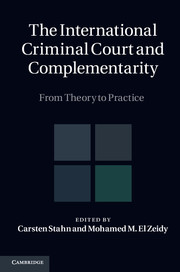Book contents
- Frontmatter
- Contents
- Acknowledgments
- Foreword by HE Judge Sang-Hyun Song
- Foreword by Patricia O’Brien
- Foreword by Silvia A. Fernandez de Gurmendi
- List of abbreviations
- Introduction: bridge over troubled waters?
- PART I General reflections
- PART II Origin and genesis of complementarity
- PART III Analytical dimensions of complementarity
- 7 Complementarity as global governance
- 8 Policy through complementarity: the atrocity trial as justice
- 9 Taking complementarity seriously
- 10 International criminal justice in the era of failed states: the ICC and the self-referral debate
- 11 The quest for constructive complementarity
- 12 Reframing positive complementarity
- 13 Too much of a good thing?: implementation and the uses of complementarity
- PART IV Interpretation and application
- PART IV (Continued) Interpretation and application
- PART V Complementarity in perspective
- PART VI Complementarity in practice
- Index
- References
8 - Policy through complementarity: the atrocity trial as justice
from PART III - Analytical dimensions of complementarity
Published online by Cambridge University Press: 05 November 2014
- Frontmatter
- Contents
- Acknowledgments
- Foreword by HE Judge Sang-Hyun Song
- Foreword by Patricia O’Brien
- Foreword by Silvia A. Fernandez de Gurmendi
- List of abbreviations
- Introduction: bridge over troubled waters?
- PART I General reflections
- PART II Origin and genesis of complementarity
- PART III Analytical dimensions of complementarity
- 7 Complementarity as global governance
- 8 Policy through complementarity: the atrocity trial as justice
- 9 Taking complementarity seriously
- 10 International criminal justice in the era of failed states: the ICC and the self-referral debate
- 11 The quest for constructive complementarity
- 12 Reframing positive complementarity
- 13 Too much of a good thing?: implementation and the uses of complementarity
- PART IV Interpretation and application
- PART IV (Continued) Interpretation and application
- PART V Complementarity in perspective
- PART VI Complementarity in practice
- Index
- References
Summary
This chapter examines the macro-architectural effects of complementarity upon the content, imagination, narrative and meaning of inter- and post-conflict transitional justice. The complementarity doctrine privileges the liberal criminal trial and its concomitant, sequestered incarceration, over other justice mechanisms. Accordingly, complementarity may encourage heterogeneity in terms of the number of institutions adjudicating international crimes, but it encourages homogeneity in terms of the process they follow and the nature of the punishment they mete out. Complementarity embeds the iconic status of the courtroom and the jailhouse as the best practice to promote justice in the aftermath of mass violence. This conceptualization of justice, rooted as it is in select individual guilt, serves important accountability goals. However, it may square poorly with the collective nature of atrocity and even clash with the expectations of local populations; moreover, it also protects state, organizational, corporate and bystander interests, while privileging the craft of the international criminal lawyer. In response, the author suggests that power relationships in international criminal law be revisited, both vertically and horizontally. More immediately, he urges a gentle and flexible interpretive understanding of complementarity – a light touch, so to speak.
Introduction
One of the themes of this book is that ‘[t]he broader implications of complementarity in international relations and domestic societies are not yet well understood and researched’. In this chapter, I aim to unpack this theme. I offer some initial, and predictive, theorizing regarding the broader effects of complementarity in international relations, transitional justice and domestic policy-making. My focus begins with how complementarity informs the International Criminal Court's (ICC) admissibility framework. I posit that complementarity is not neutral in this regard. It is normative. It implicates much more than procedure. Much like its conceptual predecessor, primacy, the complementarity doctrine privileges the atrocity trial and its concomitant, sequestered incarceration, over other mechanisms of justice, truth-definition and punishment. Whether consciously or inadvertently, complementarity risks the subordination of alternate mechanisms of justice, including, most notably, traditional and ceremonial methods, state and collective responsibility, truth commissions, public inquiries and qualified amnesties. Accordingly, complementarity may encourage heterogeneity in terms of the number of institutions adjudicating international crimes, but it encourages homogeneity in terms of the process they follow and the punishment they mete out.
- Type
- Chapter
- Information
- The International Criminal Court and ComplementarityFrom Theory to Practice, pp. 197 - 232Publisher: Cambridge University PressPrint publication year: 2011
References
- 2
- Cited by

